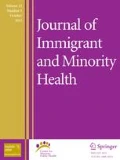Abstract
Many primary care physicians lack sufficient knowledge on current guidelines for overweight/obesity diagnosis among minority groups. We assessed physician knowledge and awareness on modified guidelines for identifying obesity among South Asian Indians (SAIs). Cross sectional survey of 183 physicians practicing in Houston, who reported on their knowledge on guidelines for obesity among SAIs, frequency of measurement of surrogate markers, self-reported competency in management of obesity, and readiness to seek training on obesity diagnosis among SAIs. 65% of physicians agree obesity is a growing problem among SAIs with only 9% of physicians reporting measuring waist circumference. Only 21% of physicians were aware of the recommended WHO modified BMI criteria and 41% the IDF criteria for waist circumference. SAI physicians had significantly higher knowledge compared to other physicians. 78% were ready to seek training on the modified guidelines across ethnicity and training. There is a low level of knowledge on ethnicity-specific guidelines for obesity diagnosis among physicians. There is however a readiness to learn, indicating the need for a physician awareness-training on current obesity guidelines, for various ethnic populations.
Similar content being viewed by others
References
Misra A, Misra R, Wijesuriya M, Banerjee D. The metabolic syndrome in South Asians: continuing escalation & possible solutions. Indian J Med Res. 2007;125(3):345–54.
Tan CE, Ma S, Wai D, Chew SK, Tai ES. Can we apply the national cholesterol education program adult treatment panel definition of the metabolic syndrome to Asians? Diabetes Care. 2004;27(5):1182–6.
Tillin T, Forouhi N, Johnston DG, McKeigue PM, Chaturvedi N, Godsland IF. Metabolic syndrome and coronary heart disease in South Asians, African-Caribbeans and white Europeans: a UK population-based cross-sectional study. Diabetologia. 2005;48(4):649–56.
Wang J, Thornton J, Russell M, Burastero S, Heymsfield S, Pierson R Jr. Asians have lower body mass index (BMI) but higher percent body fat than do whites: comparisons of anthropometric measurements. Am J Clin Nutr. 1994;60(1):23–8.
Jay M, Kalet A, Ark T, McMackern M, Messito JM, Richter R, Schlair S, Sherman S, Zabar S, Gillespie C. Physicians’ attitudes about obesity and their associations with competency and specialty: a cross-sectional study. BMC Health Serv Res. 2009; 9:106.
Harris J, Hamaday V, Mochan E. Osteopathic family physicians’ attitudes, knowledge, and self-reported practices regarding obesity. JAOA: J Am Osteopath Assoc. 1999;99(7):358–65.
Ingram DD, Parker JD, Schenker N, Weed JA, Hamilton B, Arias E et al. United States Census 2000 population with bridged race categories. Vital Health Stat Data Eval Methods Res. 2003; 2(135):1–55.
Banerjee D, Misra A. Does using ethnic specific criteria improve the usefulness of the term metabolic syndrome? Controversies and suggestions. In J Obes. 2007;31(9):1340–9.
WHO Expert Consultation. Appropriate body-mass index for Asian populations and its implications for policy and intervention strategies. Lancet. 2004;363:157–63.
Smith SC Jr, Haslam D. Abdominal obesity, waist circumference and cardiometabolic risk: awareness among primary care physicians, the general population and patients at risk—the shape of the nations survey. Current Med Res Opin. 2006; 23(1):29–47.
Kristeller J, Hoerr R. Physician attitudes toward managing obesity: differences among six specialty groups. Prev Med. 1997;26(4):542–9.
Pratt CA, Nosiri UI, Pratt CB. Michigan physicians’ perceptions of their role in managing obesity. Percept Motor Skills. 1997; 84(3 Pt 1):848–850.
Ferrante J, Piasecki A, Ohman-Strickland P, Crabtree B. Family physicians’ practices and attitudes regarding care of extremely obese patients. Behav Psychol. 2009;17(9):1710–1716.
Schuster R, Tasosa J, Terwoord N. Translational research—implementation of NHLBI Obesity Guidelines in a primary care community setting: the physician obesity awareness project. J Nutr Health Aging. 2008;12(10):764S–9S.
Acknowledgments
The project was funded by a grant obtained from the Texas Academy of Family physicians.
Author information
Authors and Affiliations
Corresponding author
Rights and permissions
About this article
Cite this article
Vasudevan, D., Stotts, A., Anabor, O.L. et al. Primary Care Physician’s Knowledge of Ethnicity-Specific Guidelines for Obesity Diagnosis and Readiness for Obesity Intervention Among South Asian Indians. J Immigrant Minority Health 14, 759–766 (2012). https://doi.org/10.1007/s10903-011-9561-7
Published:
Issue Date:
DOI: https://doi.org/10.1007/s10903-011-9561-7




